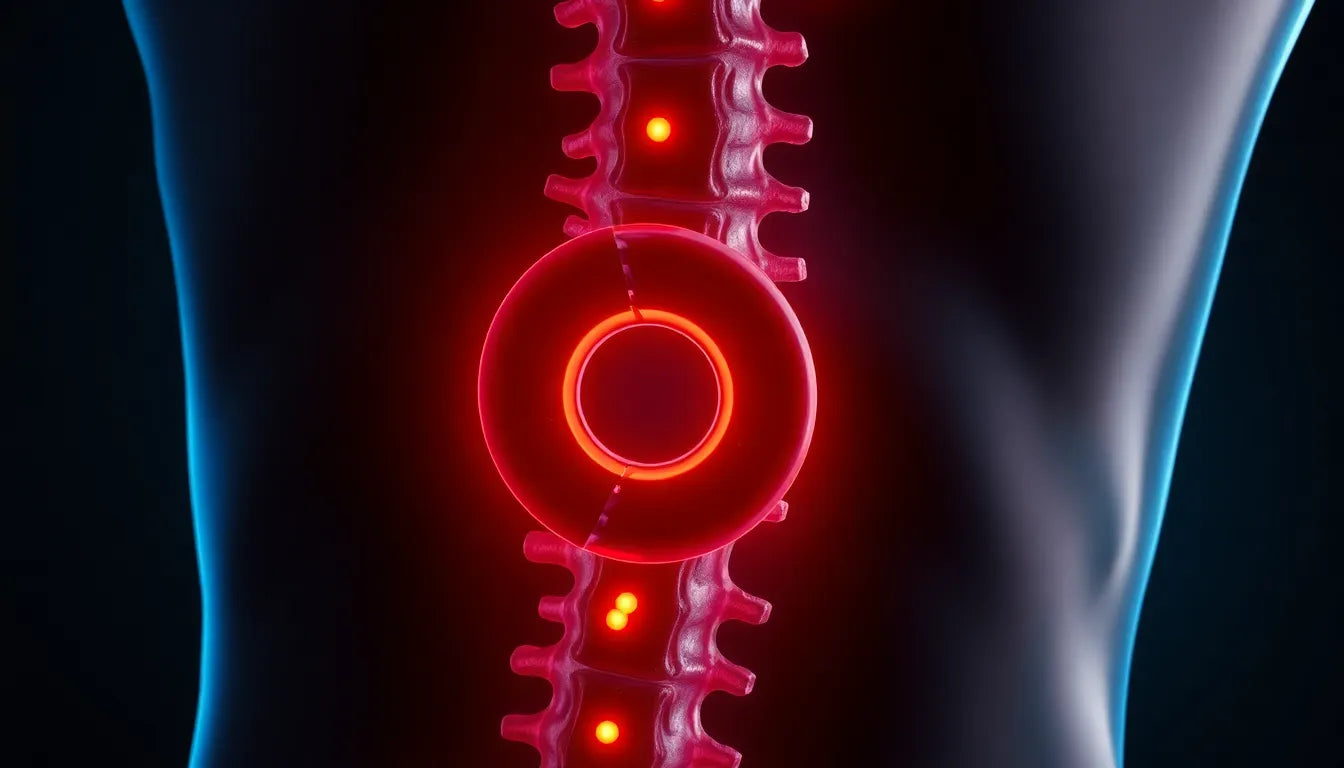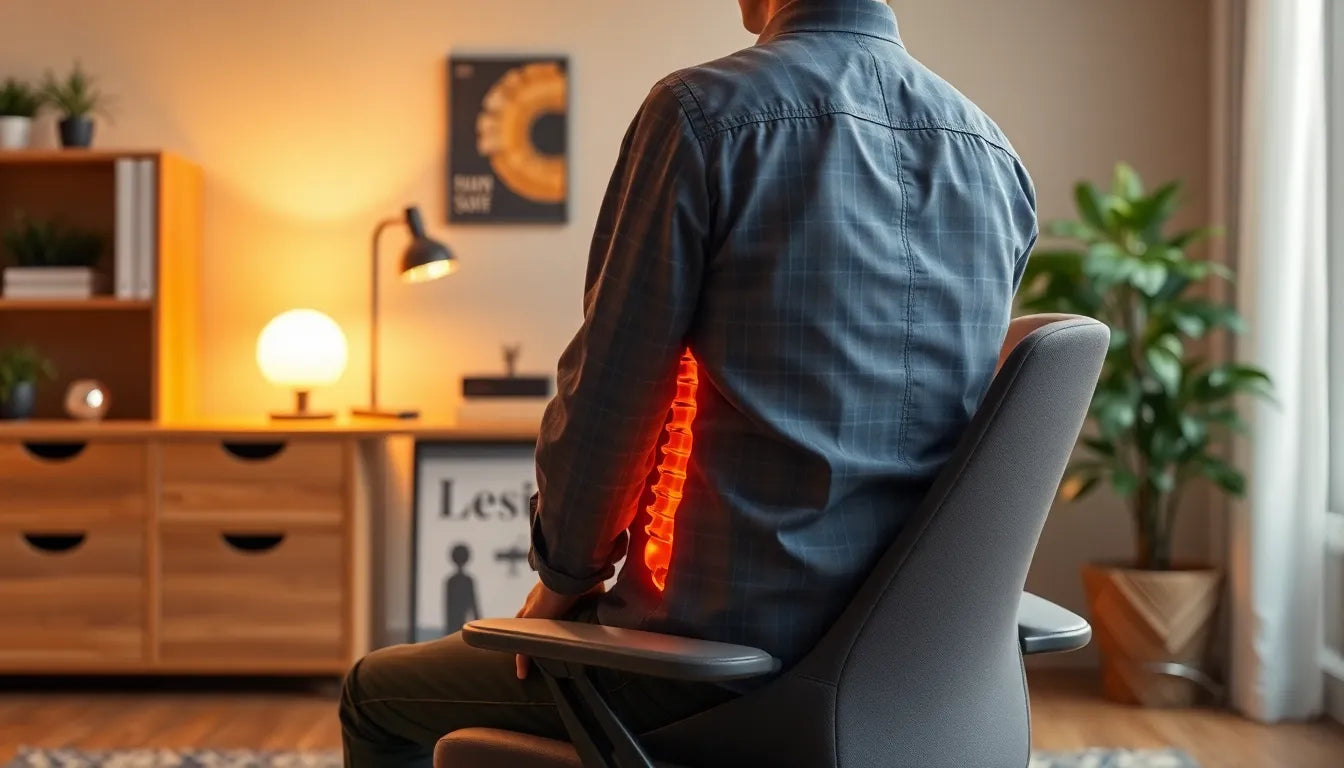Did you know that herniated discs affect approximately 5 to 20 people per 1,000 adults annually? This startling statistic highlights a common yet often misunderstood condition that can significantly impact one's quality of life. Understanding the causes of herniated discs is crucial for prevention and effective management.
Understanding herniated discs and their impact
A herniated disc, also known as a slipped or ruptured disc, occurs when the soft inner core of a spinal disc pushes through a crack in the tougher exterior casing. This can lead to pain, numbness, and muscle weakness, primarily affecting the lower back or neck. The symptoms can vary from mild discomfort to severe pain, potentially disrupting daily activities and diminishing the overall quality of life.
The spine is a complex structure composed of bones, discs, and nerves, all working in harmony to support movement and flexibility. When a disc herniates, it can press on nearby nerves, leading to the symptoms commonly associated with this condition. While some people may experience significant discomfort, others might have a herniated disc without any noticeable symptoms.
The purpose of understanding herniated disc causes
The aim of this blog post is to delve into the lesser-known triggers and risk factors for herniated discs. By shedding light on these causes, we can better equip individuals with the knowledge needed to prevent and manage this condition. Understanding what causes a herniated disc not only aids in prevention but also empowers those affected to make informed decisions about their health and well-being.
Many people are aware of the common causes such as aging, heavy lifting, and improper posture, but there are numerous other factors that can contribute to the development of a herniated disc. From genetic predispositions to lifestyle choices, the potential triggers are varied and often interconnected. By exploring these in detail, we can offer a comprehensive overview that goes beyond the basics, providing valuable insights for those seeking to maintain spinal health.
In the following sections, we will uncover these hidden triggers, providing a deeper understanding of the factors that contribute to herniated discs. This knowledge is not only essential for those currently experiencing symptoms but also for anyone looking to prevent future occurrences. By staying informed, you can take proactive steps to protect your spine and enhance your overall quality of life.
Age-related degeneration and its impact on spinal health
As we age, our bodies undergo various changes, and the spinal discs are no exception. Age-related degeneration is a leading cause of herniated discs, often resulting from the natural wear and tear of the spinal discs over time. According to the Mayo Clinic, disk degeneration is the most prevalent cause of herniated discs. This process involves the gradual loss of fluid in the discs, reducing their flexibility and decreasing their ability to absorb shocks. As a result, the discs become more susceptible to cracks and tears, making them prone to herniation.
Understanding the role of aging in spinal health is crucial for prevention. While we cannot stop the aging process, adopting healthy lifestyle habits can mitigate its effects. Regular exercise, a balanced diet, and maintaining a healthy weight are essential steps that can help preserve disc integrity and reduce the risk of herniation.
How lifestyle and occupational factors contribute to disc herniation
Beyond aging, lifestyle and occupational factors play a significant role in the development of herniated discs. Activities that involve heavy lifting, twisting, or bending can place undue stress on the spinal discs, increasing the likelihood of herniation. Occupations that require repetitive motions or involve physically demanding tasks, such as construction work or professional sports, are particularly high-risk.
Moreover, a sedentary lifestyle exacerbates the risk of disc herniation. Prolonged periods of sitting, especially with poor posture, can lead to increased pressure on the discs. Harvard Health emphasizes the importance of staying active and engaging in regular exercise to maintain spinal health. Incorporating activities that strengthen the core and improve flexibility can help support the spine and prevent disc-related issues.
The role of genetics and health conditions in herniated discs
Genetic predisposition is another factor that can influence the likelihood of developing a herniated disc. Some individuals may inherit a tendency for weaker discs, making them more susceptible to herniation. Additionally, certain health conditions can exacerbate the risk. For instance, obesity increases the strain on the spine, while smoking can impair blood flow and accelerate disc degeneration.
NewYork-Presbyterian highlights the interconnectedness of these factors, noting that genetics, obesity, and smoking are significant contributors to disc health. Addressing these risk factors proactively can help reduce the incidence of herniated discs. Quitting smoking, maintaining a healthy weight, and managing any underlying health conditions are critical steps in preserving spinal health.
Summary of common causes and risk factors
| Common Causes | Risk Factors |
|---|---|
| Age-related degeneration | Physically demanding jobs |
| Heavy lifting and twisting | Sedentary lifestyle |
| Genetic predisposition | Obesity |
| Health conditions (e.g., obesity, smoking) | Family history |
Understanding these factors provides valuable insights into the causes of herniated discs. By recognizing the interplay between aging, lifestyle, genetics, and health conditions, individuals can take informed steps to protect their spinal health. In the next section, we will explore additional triggers and preventive measures to further empower readers in managing and preventing herniated discs.
Trauma and injury: unexpected causes of herniated discs
While age-related degeneration and lifestyle factors are well-known contributors to herniated discs, trauma and injury can also play a significant role. Sudden pressure or forceful impact, such as from a fall or accident, can cause a disc to rupture. The University of Maryland Medical Center notes that these events can lead to immediate herniation, particularly if the disc is already weakened by age or other factors.
Additionally, weakened ligaments and connective tissue disorders can increase the risk of disc herniation. According to the NCBI Bookshelf, individuals with these conditions may experience compromised spinal support, making the discs more vulnerable to injury. Understanding these risk factors is crucial for those involved in high-impact activities or sports, as they may need to take extra precautions to protect their spine.
Effective prevention tips for maintaining spinal health
Preventing herniated discs involves a multifaceted approach that addresses various risk factors. Regular exercise is essential for maintaining a healthy weight and strengthening the muscles that support the spine. Activities such as yoga and Pilates can improve flexibility and core strength, reducing the likelihood of disc-related issues.
Proper ergonomic practices are vital, particularly for those with sedentary jobs. Ensuring that workstations are set up to support good posture can significantly reduce the strain on the spine. Additionally, taking regular breaks to stand, stretch, and move can alleviate pressure on the discs.
Smoking cessation and managing existing health conditions, such as obesity, are also crucial. Smoking can accelerate disc degeneration by impairing blood flow, while excess weight increases the mechanical load on the spine. Addressing these factors can significantly reduce the risk of herniated discs and improve overall spinal health.
Frequently Asked Questions
What are the early signs of a herniated disc?
Early signs of a herniated disc often include localized pain, numbness, and tingling in the affected area. Some individuals may also experience muscle weakness. These symptoms can vary depending on the location and severity of the herniation.
Can herniated discs heal on their own?
In some cases, herniated discs can heal over time with conservative treatment, such as rest, physical therapy, and anti-inflammatory medications. However, if symptoms persist or worsen, it is important to seek medical attention to explore further treatment options.
How can I prevent a herniated disc?
Preventing a herniated disc involves maintaining a healthy lifestyle, including regular exercise, proper lifting techniques, and ergonomic practices. Avoiding smoking and managing weight are also important preventive measures.
What are the best ergonomic aids for back pain?
Ergonomic aids such as adjustable chairs, lumbar support cushions, and standing desks can help maintain proper posture and reduce back pain. These tools are designed to support spinal alignment and minimize strain during prolonged periods of sitting or standing.
Understanding the causes and risk factors of herniated discs is essential for prevention and management. By implementing preventive measures and consulting healthcare professionals for personalized advice, individuals can take proactive steps to protect their spinal health and enhance their quality of life.
Sources
- Mayo Clinic. (n.d.). "Herniated Disk: Symptoms and Causes."
- American Association of Neurological Surgeons. (n.d.). "Herniated Disc: Causes and Overview."
- Harvard Health. (n.d.). "Herniated Disk: Causes and Common Misconceptions."
- University of Maryland Medical Center. (n.d.). "Herniated Disk: Patient Guide."
- NCBI Bookshelf. (n.d.). "Herniated Disc: Clinical Perspective."
- NewYork-Presbyterian. (n.d.). "Herniated Disc: Symptoms & Causes."


















